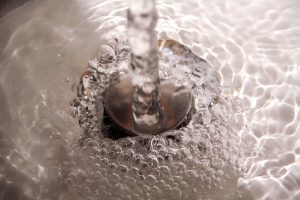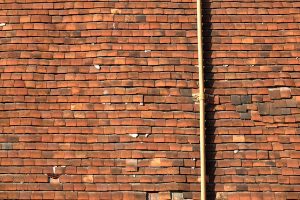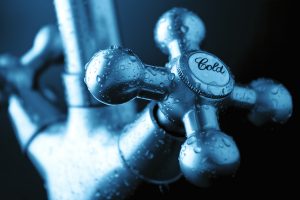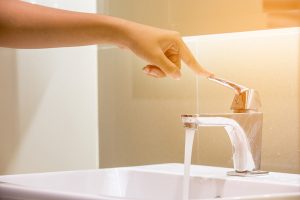
Does it seem like your plumbing is capable of producing an endless number of inscrutable noises? Chattering, clattering, gurgling, or rattling at random intervals, seemingly just to make you nervous? Do you think “that doesn’t sound right” about every time you turn a faucet?
We’ve got some good news. As is the case with most plumbing mysteries, when you know why your plumbing is making the noises it is, 99% of the time, you’ll find the cause is simple and easily addressed. Here’s what those ominous noises probably mean, and what you can do about them.
Gurgling Drain

If your sink or bathtub drain gurgles for awhile after you use it, the problem is either venting or blockage. If something like hair, sediment buildup, or grease has formed a partial blockage in the drain, the water flowing down it has to work harder to move through. That struggle makes the gurgling sound you’re hearing.
If the gurgling sound comes from multiple drains, or if another drain makes the sound while you use an unrelated water appliance, venting is probably the problem. When your drains aren’t properly vented, an air vacuum can enter the pipes and put suction on the water as it attempts to travel down the drain, creating a gurgle. Make sure your vent isn’t blocked, or install a vent if you don’t have one.
Rattling Pipes

It’s easy to forget, but water travels through your pipes fast. That current gets powerful. If your pipes aren’t well-secured, they may rattle around as your water violently passes through them.
See if you can locate the source of the pipe-rattling noise. Make sure you check your basement ceilings, especially if your basement is unfinished. The pipes that are rattling probably aren’t affixed to a stationary anchor to keep them from moving around.
If the pipes lay against a wall or another anchor naturally, all you have to do to solve the problem is find a way to securely fasten the pipes against that anchor. If there isn’t a good natural anchor nearby, you can buy and easily install some simple pipe-holding devices. These L-shaped bars of metal can be installed into walls via screws and hold your pipes in place. You can find them at most hardware stores.
Hissing Faucet

A faucet that hisses when you turn it on usually means your water is too pressurized. The water shoots through the pipes and out of the faucet with too much force. Over a long-enough period of time, high-pressure water can damage pipes and appliances, so if you hear a hiss when you turn your faucet on, consider calling your water company. They’ll be able to tell you if your water pressure is higher than it should be.
You could also double-check your water pressure regulator to make sure it’s working properly and set correctly. Normally, the water pressure regulator should be set to its default factory setting and then left alone. If an earlier homeowner adjusted it, however, it may be worth setting it back. Find your water pressure regulator just downstream of your water meter. Not all regulators have a PSI indicator, so you may need to install one. Make sure you know the proper setting before you attempt to adjust your regulator. You can also call us and we’ll help you adjust it safely.
Chattering or Screeching Valves

If the valves or faucets on one of your water appliances screech or chatter as you start to turn them on, it’s probably because of a loose or defective part somewhere in the faucet. You can easily address the problem by simply replacing the valve or faucet with a new one.
Take off the faucet and either record its measurements or take it with you when you go to your local hardware store. Find a replacement of the same measurements and shapes, and make sure it’ll work for your appliance. The replacement faucet or valve will come with an instruction booklet. Replacing the valve or faucet should solve your problem. If you’re unsure about whether or not you should replace something, or if you want some installation help, you can always count on our help, too.
Do you see your annoying sound on this list? If not, don’t panic! There are so many plumbing noises we can solve that we’ll release our “What’s that Sound? Part 2” blog later this month. There’s not a single plumbing sound we can’t figure out.
If you can’t wait to solve your problem, give us a call anytime. We’ll identify and fix your problem fast and effectively, so you can enjoy a peaceful–and quiet!–home again.


